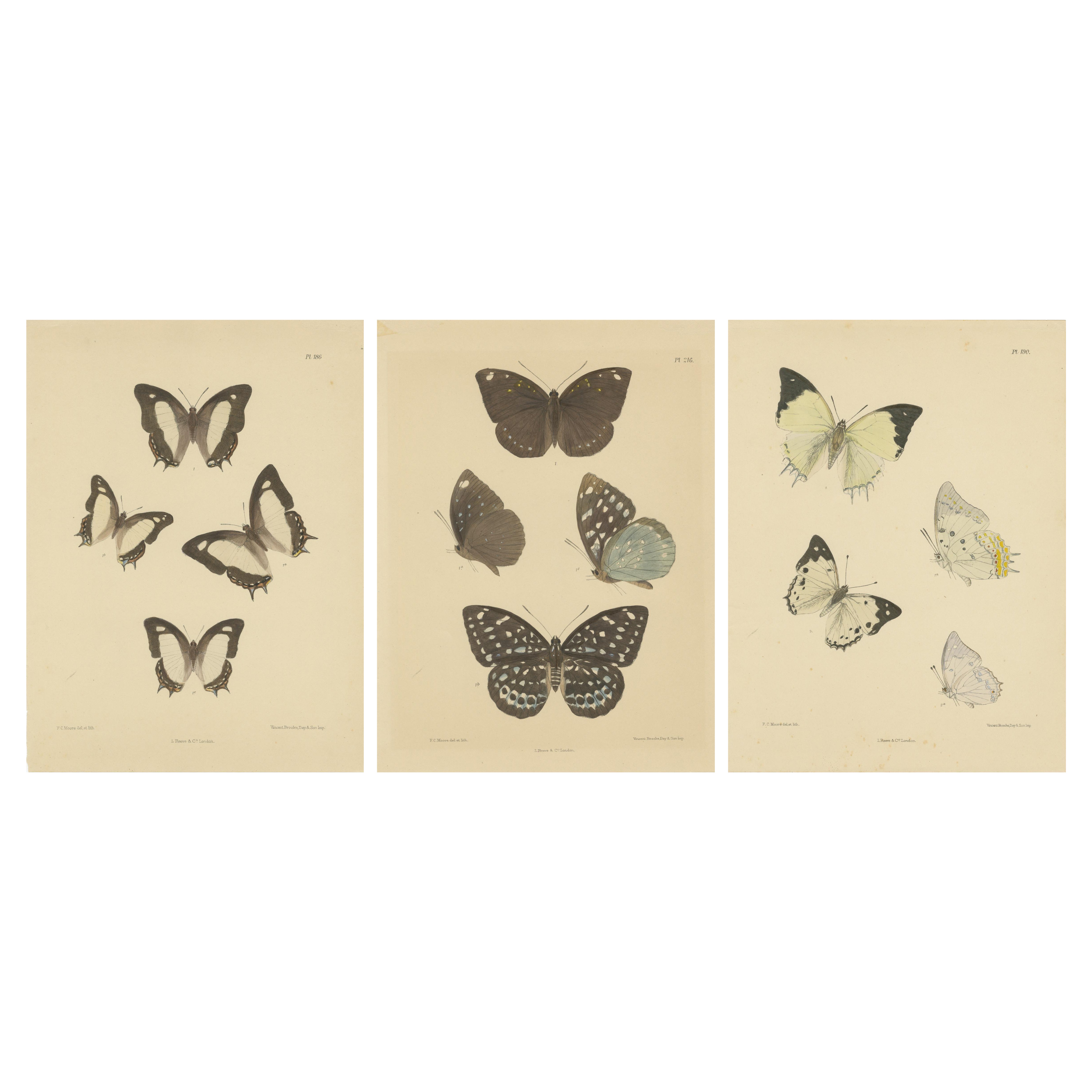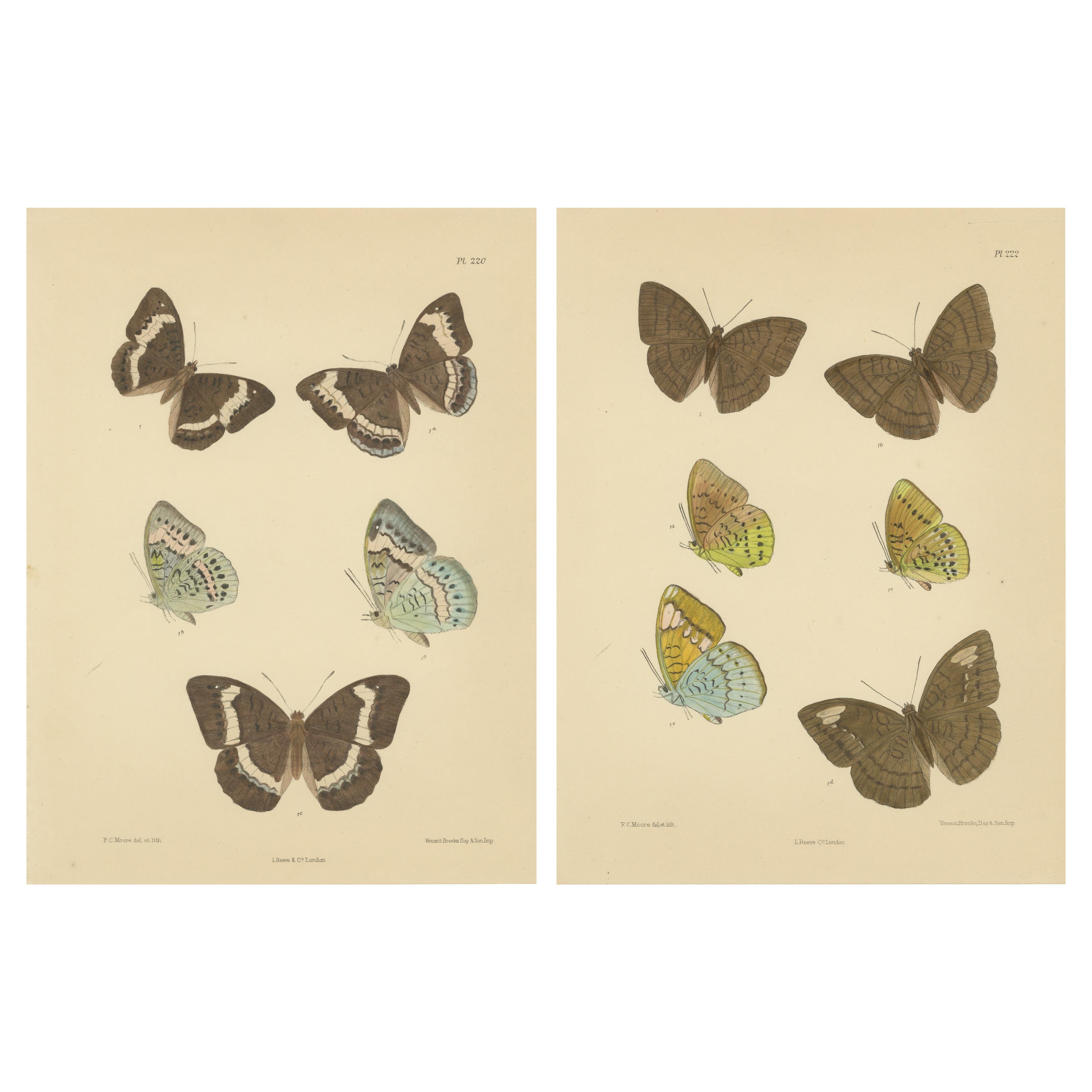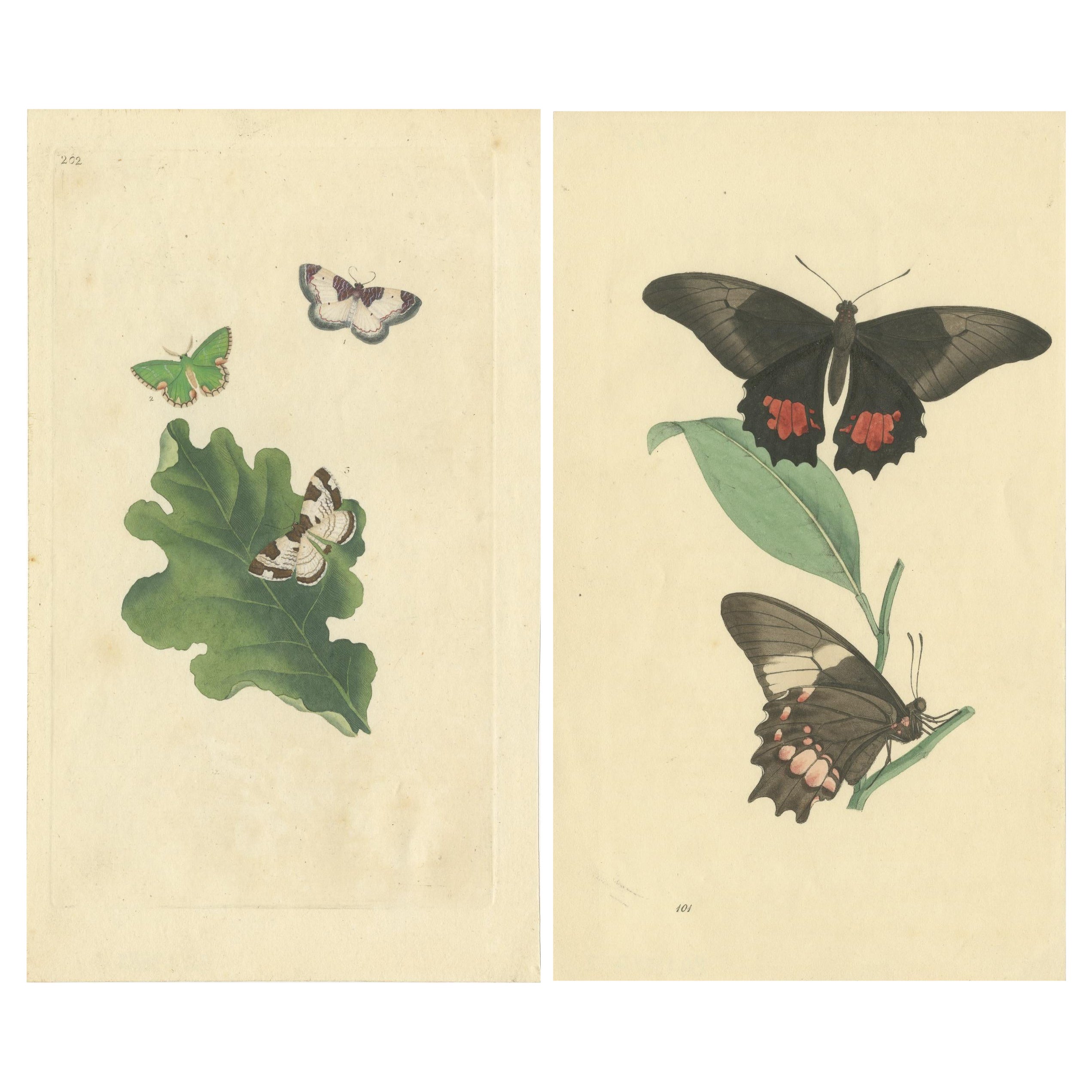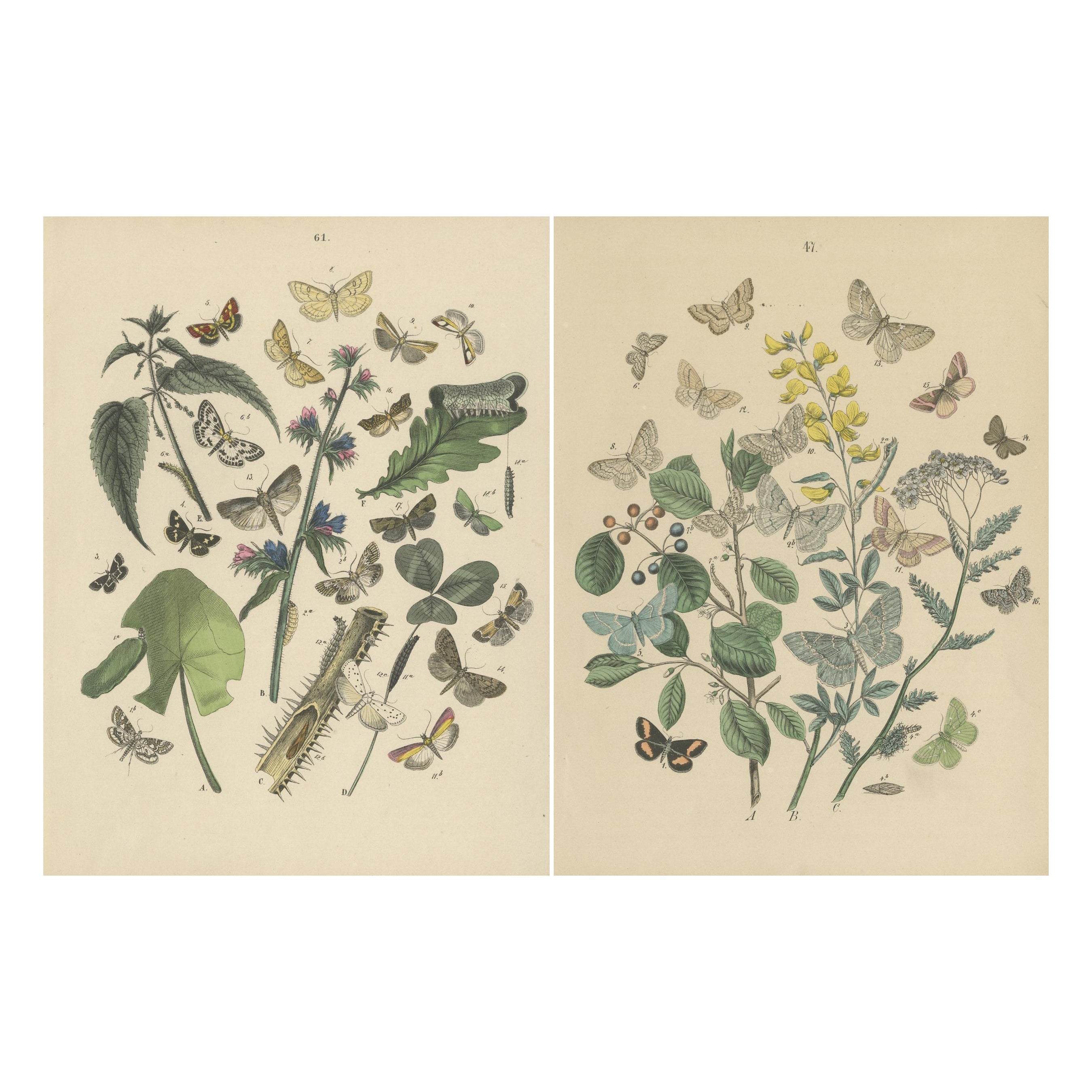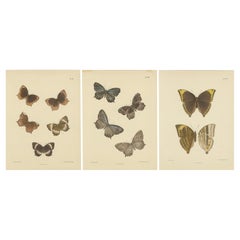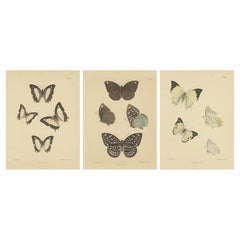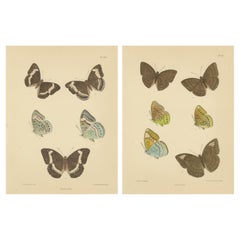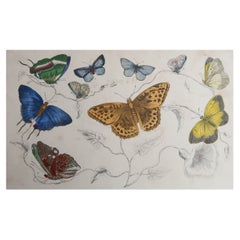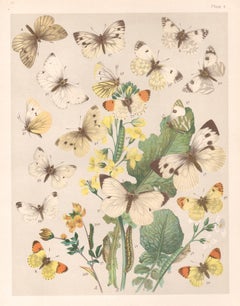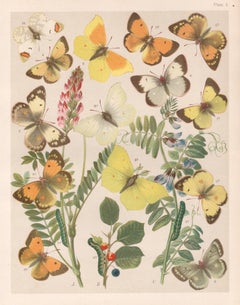Items Similar to Exquisite 19th-Century Butterfly Lithographs: A Study of Exotic Lepidoptera
Want more images or videos?
Request additional images or videos from the seller
1 of 6
Exquisite 19th-Century Butterfly Lithographs: A Study of Exotic Lepidoptera
$181.17per set
$226.47per set20% Off
£134.15per set
£167.69per set20% Off
€152per set
€190per set20% Off
CA$249.14per set
CA$311.42per set20% Off
A$277.07per set
A$346.33per set20% Off
CHF 145.03per set
CHF 181.29per set20% Off
MX$3,379.87per set
MX$4,224.84per set20% Off
NOK 1,822.37per set
NOK 2,277.97per set20% Off
SEK 1,714.18per set
SEK 2,142.72per set20% Off
DKK 1,157.27per set
DKK 1,446.59per set20% Off
About the Item
Exquisite 19th-Century Butterfly Lithographs: A Study of Exotic Lepidoptera by F. Hochmanz, Stuttgart
This stunning compilation of 19th-century lithographs beautifully captures the intricate diversity of exotic butterfly species, artistically rendered by F. Hochmanz in Stuttgart. These prints showcase butterflies in various stages of their life cycle, depicted in lush, natural settings surrounded by foliage and blossoms. The attention to detail is striking, bringing out the vibrancy of the butterflies' patterns, hues, and unique anatomy, all reminiscent of the fascination with the natural world during the 1800s. Each lithograph offers a glimpse into the remarkable biodiversity that has enchanted nature lovers for centuries.
The first print features a captivating selection of moths and caterpillars, each labeled to highlight its distinct phase of metamorphosis. With muted colors, soft greens, and graceful plant structures, the imagery focuses on the lifecycle of hawk moths, with their characteristic wing markings and nocturnal allure. The depiction is vivid yet scientifically accurate, making this print both artistically pleasing and educational.
In the second print, the vibrancy of the butterflies' wings is truly brought to life. We see a dazzling arrangement of butterflies with vivid wings in yellow, purple, and black adorned with geometric patterns and colorful markings. Caterpillars at various stages of development are also featured, with an intricate connection between the butterflies, their natural habitat, and the host plants upon which they feed. This balance between insect and environment is a testament to the importance of the relationship between flora and fauna.
The third lithograph features some of the most beloved European butterfly species, such as the Peacock, Small Tortoiseshell, and Red Admiral, each known for its bright and bold markings. The delicately hand-colored prints capture these butterflies perched on meadow plants, underscoring their role in the pollination cycle. The undulating forms of the caterpillars crawling on the foliage add a sense of life to the composition, illustrating the different phases that lead to the emergence of these colorful creatures.
These lithographs are not merely scientific studies but also beautiful works of art. Their subtle hand-coloring, botanical accuracy, and intricate detail make them treasures of the 19th-century fascination with natural history and the beauty of the Lepidoptera family. Collectors and admirers of antique prints will appreciate these works for their unique combination of artistic expression and scientific knowledge, offering a timeless window into the mesmerizing beauty of butterflies and moths.
The lithographs are in good condition, with vivid colors and some fading. Slight foxing and age-related toning are present, particularly on the edges. - adding to its patina. No tears or major defects observed. Suitable for framing or further preservation.
- Dimensions:Height: 11.03 in (28 cm)Width: 8.27 in (21 cm)Depth: 0.01 in (0.2 mm)
- Sold As:Set of 3
- Materials and Techniques:
- Period:
- Date of Manufacture:circa 1860
- Condition:Good condition, with vivid colors and minimal fading. Slight foxing and age-related toning are present, particularly on the edges. No tears or major defects observed. Suitable for framing or further preservation. Study the images carefully.
- Seller Location:Langweer, NL
- Reference Number:Seller: BG-13887-21, -35, -361stDibs: LU3054342445412
About the Seller
5.0
Recognized Seller
These prestigious sellers are industry leaders and represent the highest echelon for item quality and design.
Platinum Seller
Premium sellers with a 4.7+ rating and 24-hour response times
Established in 2009
1stDibs seller since 2017
2,593 sales on 1stDibs
Typical response time: <1 hour
- ShippingRetrieving quote...Shipping from: Langweer, Netherlands
- Return Policy
Authenticity Guarantee
In the unlikely event there’s an issue with an item’s authenticity, contact us within 1 year for a full refund. DetailsMoney-Back Guarantee
If your item is not as described, is damaged in transit, or does not arrive, contact us within 7 days for a full refund. Details24-Hour Cancellation
You have a 24-hour grace period in which to reconsider your purchase, with no questions asked.Vetted Professional Sellers
Our world-class sellers must adhere to strict standards for service and quality, maintaining the integrity of our listings.Price-Match Guarantee
If you find that a seller listed the same item for a lower price elsewhere, we’ll match it.Trusted Global Delivery
Our best-in-class carrier network provides specialized shipping options worldwide, including custom delivery.More From This Seller
View AllEnchanting Victorian Butterfly Lithographs: Vivid Prints of Rare Species, 1878
Located in Langweer, NL
Enchanting Victorian Butterfly Lithographs: Vivid Portraits of Rare Species by Frederic C. Moore
These enchanting butterfly lithographs by Frede...
Category
Antique 1870s Prints
Materials
Paper
$324 Sale Price / set
20% Off
Victorian Butterfly Treasures: Captivating Hand-Colored Lithographs, 1878
Located in Langweer, NL
Victorian Butterfly Treasures: Captivating Hand-Colored Lithographs by Frederic C. Moore
Description: This exquisite set of lithographs by Frederic C. Moore, created in 1878, offer...
Category
Antique 1870s Prints
Materials
Paper
$324 Sale Price / set
20% Off
Majestic Victorian Butterfly Illustrations: Rare and Detailed Portraits, 1878
Located in Langweer, NL
Majestic Victorian Butterfly Illustrations: Rare and Detailed Portraits by Frederic C. Moore
This collection features beautiful 19th-century butterfly lithographs by Frederic C. Moo...
Category
Antique 1870s Prints
Materials
Paper
$324 Sale Price / set
20% Off
Vibrant Victorian Butterfly Lithographs: Delicate Portraits by Frederic C. Moore
Located in Langweer, NL
Vibrant Victorian Butterfly Lithographs: Delicate Portraits by Frederic C. Moore
This remarkable pair of lithographs, created by Frederic C. Moo...
Category
Antique 1870s Prints
Materials
Paper
$247 Sale Price / set
20% Off
Exquisite Hand-Coloured Butterfly Prints of the 18th and 19th-Century
Located in Langweer, NL
Antique Illustrations of Colorful Insects: Hand-Colored Engravings from the 18th and 19th Century
This exquisite pair of antique prints showcases vibrant depictions of colorful inse...
Category
Antique 1790s Prints
Materials
Paper
$228 Sale Price / set
20% Off
Victorian Moth Illustrations by William Forsell Kirby, 1882
Located in Langweer, NL
Description of the Prints
First Print: Beauty, Peacock, and Waved Moths
This print showcases an array of intricately detailed moths and their associated flora. The Beauty, Peacock,...
Category
Antique 1880s Prints
Materials
Paper
$152 Sale Price
20% Off
You May Also Like
Original Antique Print of Butterflies, 1847, Unframed
Located in St Annes, Lancashire
Great image of butterflies.
Unframed. It gives you the option of perhaps making a set up using your own choice of frames.
Lithograph after Cpt. brown with original hand color.
Pub...
Category
Antique 1840s English Folk Art Prints
Materials
Paper
Butterflies, English antique natural history Lepidoptera chromolithograph print
Located in Melbourne, Victoria
English butterfly chromolithograph, circa 1900. Plate number top right. From an English series of illustrations of butterflies and moths. Butterflies / moths are numbered and there i...
Category
Early 1900s Art Nouveau Animal Prints
Materials
Lithograph
Butterflies, English antique natural history Lepidoptera chromolithograph print
Located in Melbourne, Victoria
English butterfly chromolithograph, circa 1900. Plate number top right. From an English series of illustrations of butterflies and moths. Butterflies / moths are numbered and there i...
Category
Early 1900s Art Nouveau Animal Prints
Materials
Lithograph
Butterflies, English antique natural history Lepidoptera chromolithograph print
Located in Melbourne, Victoria
English butterfly chromolithograph, circa 1900. Plate number top right. From an English series of illustrations of butterflies and moths. Butterflies / moths are numbered and there i...
Category
Early 1900s Art Nouveau Animal Prints
Materials
Lithograph
Butterflies, English antique natural history Lepidoptera chromolithograph print
Located in Melbourne, Victoria
English butterfly chromolithograph, circa 1900. Plate number top right. From an English series of illustrations of butterflies and moths. Butterflies / moths are numbered and there i...
Category
Early 1900s Art Nouveau Animal Prints
Materials
Lithograph
Butterflies, English antique natural history Lepidoptera chromolithograph print
Located in Melbourne, Victoria
English butterfly chromolithograph, circa 1900. Plate number top right. From an English series of illustrations of butterflies and moths. Butterflies / moths are numbered and there i...
Category
Early 1900s Art Nouveau Animal Prints
Materials
Lithograph
More Ways To Browse
Lithograph 1800s
Vintage Merry Go Round
Vintage Perfume With Atomizers
Vintage Rubber Ball
Vintage Tea Cups England
White Horse Statue
Widdicomb Burl
Wiener Werkstatte Bronze
Willy Guhl Loop Chair
Wood Horse Statue
Woodard Aluminum
Wrought Iron Chairs Orange
Zeeland Furniture Company
Zen Calligraphy
16th Century Ming Plates
17th Century Teapots
1800 Antique China Cabinet
1870 Carriage

